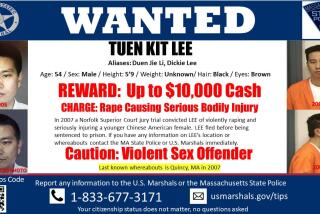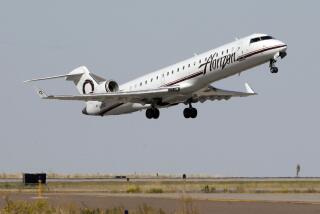Alleged Hijacker Brought Back to U.S. After 32 Years
- Share via
Thirty-two years after he escaped from a California prison and allegedly hijacked a passenger jet to Cuba, a Los Angeles man was returned Friday to the United States to face federal air piracy and kidnapping charges.
Byron Vaughn Booth, 56, was deported from Nigeria, where he had been living for many years, following an odyssey that took him from Cuba to Algeria, North Korea to Egypt, the FBI said.
At the time of his arrest by Nigerian authorities, Booth was indigent and homeless, sleeping on the streets of Lagos, the capital, according to the FBI.
U.S. diplomats in Nigeria had been aware of his presence there. Over the last decade, he had been in touch with them by telephone and in face-to-face meetings outside the embassy, where they have no arrest powers.
Booth had expressed an interest in returning to the United States, but never followed up on his overtures, an FBI official said.
His arrest comes at a time when long-strained relations between Nigeria and the United States have warmed considerably.
Booth was flown to Washington, D.C., Friday with a U.S. Marshals Service escort. He is to appear before a federal magistrate Monday in Alexandria, Va., and is expected to be prosecuted in Los Angeles.
Thirty-two years ago today Booth and another inmate, Clinton Robert Smith Jr., walked away from a minimum security section of the California Institution for Men in Chino. Booth was serving a term of five years to life for first-degree armed robbery. Smith was serving five years for second-degree robbery. Both were considered model prisoners.
A California Department of Corrections spokesman said Friday that the agency’s computerized files indicated that Booth had been “discharged” from custody. He promised to check further.
A day after they escaped, Booth and Smith made their way to Los Angeles International Airport, the FBI said, where they bought tickets for National Airlines Flight 64, bound for Miami, with a stopover in New Orleans.
After the DC-8 left New Orleans and headed out over the Gulf of Mexico, Booth and Smith, wielding a .38-caliber handgun and four sticks of dynamite, ordered the captain to fly to Cuba, authorities said.
“I assured them there were no heroes aboard and we were going to Havana,” the pilot said later.
Airplane hijackings to Cuba were commonplace at the time. On the same day as the National Airlines plane was hijacked, an Eastern Airlines flight from Philadelphia to Miami was also diverted at gunpoint to Havana. It was the third double-hijacking day that month. The wave of air piracy finally subsided when Cuba announced that it would no longer offer sanctuary to hijackers.
The National Airlines crew and the other 30 passengers were allowed to return to the United States after the plane landed in Cuba. Booth and Smith were taken into custody but were quickly released, despite demands by U.S. authorities for their return.
From Cuba, the FBI said, Booth and Smith traveled together to Algeria, then to North Korea, Egypt and back to Algeria, where they took up residence.
While living in Algiers, Smith was reportedly murdered. The FBI said that this has never been confirmed and that a warrant for his arrest remains in effect.
Booth eventually made his way to Nigeria, where he had been living since at least 1989, according to the FBI.
He was charged with air piracy and kidnapping in Miami and Los Angeles, but federal prosecutors have decided to try the case here.
“This is another example of a person who committed a serious crime and fled the country, but was not able to escape the fact that he would eventually have to answer to society for his criminal behavior,” said James V. DeSarno Jr., head of the FBI’s Los Angeles field office.
At the time he escaped, Booth had served four years of his term and was working as an attendant at the prison hospital.
A wanted poster that was circulated after his escape indicated he had used 13 aliases over the years and had been arrested by police in Cleveland and Los Angeles. He also had a bullet wound scar on his right knee.
More to Read
Sign up for Essential California
The most important California stories and recommendations in your inbox every morning.
You may occasionally receive promotional content from the Los Angeles Times.










